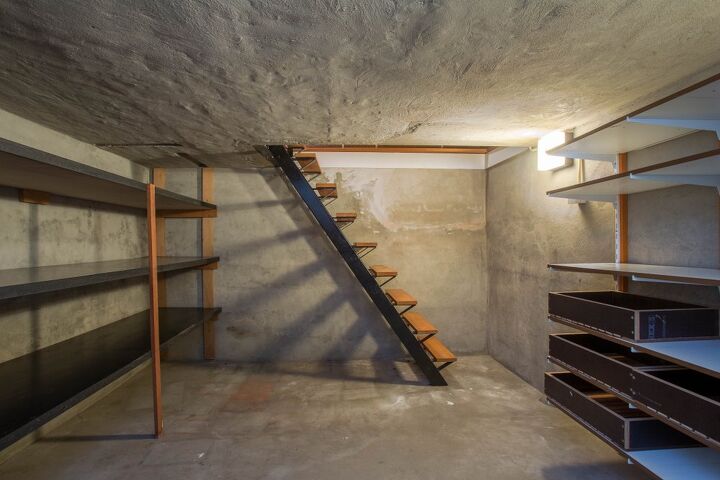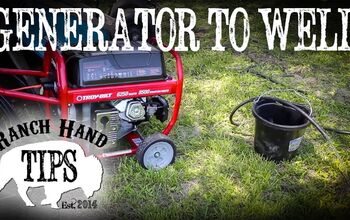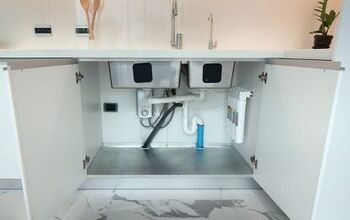Is Your Basement Floor Sinking? (Possible Causes & Fixes)

When you purchase a new home you don’t expect to have any fundamental problems with it for many years. Cracked and sinking basement floors is often an image you associate with an old unkempt home. Sinking basement floors can actually occur at the inception of a house’s lifespan. It is important to know how much sinking is normal, and what is not.
Your basement floor sinking may be the result of a sinking foundation. Improper or excessive foundation settling can also cause the basement floor to sink. A broken water or sewer pipe can cause issues under the house and make the floor sink as well. You can try to install additional drainage, but if the problem persists call a professional.
Before you prepare to repair your sinking basement floor, you first need to identify why it is sinking. Some causes are minor and normal, while others are serious and require immediate attention.
Do You Need Concrete Foundation Repair Services?
Get free, zero-commitment quotes from pro contractors near you.

Sinking Foundation
The most common cause for your basement floor to sink is a sinking foundation. There are several signs to notice if your basement sinking is the result of a sinking foundation.
- Cracks In The Wall And Floor. Cracks in plaster and drywall are fairly common and easy to fix. If you find yourself patching the same crack multiple times the problem may be a sinking foundation. Wall cracks located near your windows and doors are often signs that your basement floor and foundation are sinking.
- Jammed Doors And Windows. If you notice your basement floor is sinking and then you struggle to open doors, then the foundation may be to blame. Stuck doors and jammed windows are signs the building is shifting due to a sinking foundation.
- Uneven Floor. You may see that your basement floor is sinking, but you should also check to see if it is uneven throughout the basement. Use a level on several areas of the basement floor to determine if the floor is uneven throughout. If it is, the foundation may be the root of the problem.
- Floor Cracks. Some minor floor cracks are normal. Larger cracks, especially ones that seem to widen over time, are signs that your sinking basement floor is caused by a sinking and possibly unstable foundation. This is a red flag that should be addressed immediately.
Improper Settling
When a house is first built the foundation will naturally sink a bit. This process is called settling. Your house can sink up to a few inches in the first years after it is built. This is normal.
If you notice your house continues to “settle” after it’s first several years the house may be settling improperly or excessively. You may also notice your home is settling rapidly. The settling process should be gradual. If your basement floor sinking occurs rapidly then there is likely something deeper at play than just normal foundation settling.
Broken Pipe Or Sewer Line
Burst water pipes and broken sewer lines can cause your basement floor to sink. When a pipe bursts it floods the immediate area. If the pipes are located underneath the house (which they often are) then the area underneath your house floods. This causes high pressure that can crack through the foundation, and cause your basement floor to sink.
Water and sewage leaks can also create dangerous sinkholes. The high water pressure can penetrate through mud, and also create heavyweight on the soft ground. This can cause a sinkhole once the water stops, and cause your basement to sink.
If your water pressure changes or shuts off completely at the same time your basement floor starts to sink then a water pipe can be the root cause. This problem should be addressed immediately to prevent further damage.
How Is Your Drainage?
A water pipe burst or sewer line leak are not the only ways the area around your home can flood. Any major flooding around and under your house can wreak havoc on your basement floor’s integrity. There are, however, several ways you can prevent dangerous flooding and over-saturation near your home.
Ways to Improve Drainage
- Correct Your Landscape Grading. You can change the slope of your lawn and landscaping to direct water away from your home. You can even build a berm to guide water flow directly away from the home.
- Add Additional Drainage. Sometimes your existing drainage does not have the capacity to handle the amount of water runoff outside your home. French Drains are one popular addition to your existing drainage system. Try any additional drainage that can effectively catch and redirect water away from your home’s foundation.
- Inspect Your Gutters And Downspouts. Be sure to always keep your gutters and downspouts clean and fully functional. Also, monitor their effectiveness. There are many types of gutters and downspouts. Make sure you have the most effective type for your local weather conditions.
- Buy A Quality Sump Pump. If you have a home with a sump pump make sure it is a high-quality device and in good working order. A sump pump is a great way to decrease flooding and water damage in the home. If used properly they can also help prevent structural damage to the home.
Tip: Not all homes have or require a sump pump. Research the pros and cons of sump pumps before installing one.
Bad Concrete
Your basement floor can sink due to poorly mixed and slayed concrete. If you notice the basement sinking shortly after the home is built you may want to investigate how the concrete was mixed. A bad water-to-mix ratio can affect how concrete settles and dries.
Also, not allowing enough time for concrete to dry and set can cause it to crack and sink due to a higher moisture content.
Call In An Expert
Some minor issues like small cracks in the basement floor can be fixed easily. When your entire basement is sinking however, you should definitely call an expert to assist with the issue.
A professional can find the exact reason why your basement floor is sinking. Although the problem may be costly to fix, you can at least know the work will be done properly and the problem should not continue to come back.
TIP: Fixing a sinking basement can be expensive, so be sure to get multiple estimates and do your research before you agree to the repairs.
Check Your Insurance Policy
When you notice your basement floor sinking you should check your home insurance before making any major decisions. Home insurance policies vary when it comes to basement floor damage. The coverage often varies based on area, climate and proximity to water.
Policies rarely cover structural basement damage that is caused due to poor construction, or normal house settling. Some policies will cover damage due to a pipe burst or a leak. Regardless, be sure to find the root cause of why your basement is leaking. Contact your insurance to see what next steps you should take. This could potentially save you thousands of dollars.
Related Questions
How Much Does It Cost To Fix Your Basement Floor?
Fixing your sinking basement floor is often a costly but necessary expense. The price depends entirely on the root cause of the sinking floor. If the problem is mostly cosmetic, additional concrete or filler can be used to improve the problem. Smaller causes will cost around $1,000.If the issue is a major problem with the foundation the price will be significantly higher. Foundation repair usually costs thousands of dollars. If you have a large home a new foundation can cost as much as $40,000. The average cost of a new foundation is about $10,000.
Do I need To Fill Cracks In The Basement Floor?
Sometimes cracks form in your basement floor. These cracks may look small and harmless but they can let in moisture, pests and even gas. They can potentially cause larger problems down the road if they are not sealed.As a rule, any crack wider that 1/8-inch should be filled. Cracks smaller than that are often just cosmetic. Tiny cracks may form as a result of concrete drying and settling. If you are on the fence you should seal it to be safe.
How Long Does It Take a House To Settle?
A house should fully settle within the first 4 years it is built. It is normal for new houses to settle and sink a few inches in these first few years. You may notice a small separation between the floor and the wall. Or you may notice a small gap in the ceiling. This is normal.If a house continues to sink after the first few years, and more major gaps, dips or cracks become visible you should investigate further. This could be a more significant problem with the foundation itself and should be addressed as soon as possible.
Do You Need Concrete Foundation Repair Services?
Get free, zero-commitment quotes from pro contractors near you.

Summing It Up
When you notice your basement floor sinking the first reaction may be panic. It is important to know that some basement sinking is normal and expected in a home. Still, be sure to investigate further because the sinking basement floor may be a sign of an even larger issue. If you can not find the cause of the problem call in a professional or two for an estimate.

Tom Gaffey is an expert writer who currently resides in Washington D.C. Tom has a passion for real estate and home improvement writing, as well as travel and lifestyle writing. He lived the last twelve years in Hawaii where he worked closely with luxury resorts and event planners, mastering his knowledge of aesthetics and luxury products. This is where he found his passion for home improvement and a keen interest in DIY projects. Currently, Tom resides in Washington D.C, and also working on his debut fiction novel.
More by Tom Gaffey



























